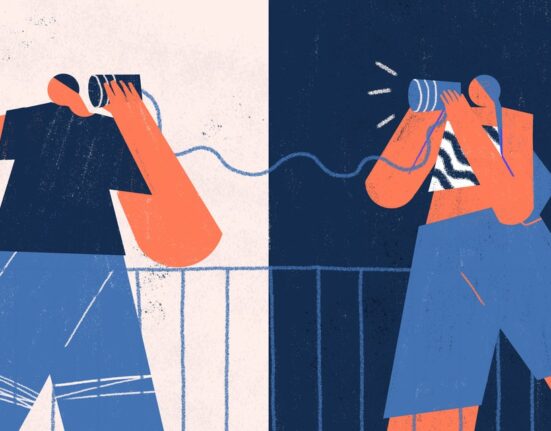Should I keep or ought to I move? Many of us hold wrestled with this query in some unspecified time in the future in our romantic lives. Whether you’re fighting poisonous relationship dynamics, bodily or emotional distance, infidelity, clashing values, otherwise you’re merely outgrowing one another, for those who begin considering breaking apart with somebody, you realize one thing isn’t working.
In my work as a psychotherapist for people and couples, ambivalence about ending a relationship comes up steadily in remedy periods. Clients usually divulge me: “Maybe if I give it just a few extra months, issues will change.” “Maybe we simply want some house.” “Maybe couples remedy will back.” “Maybe I ought to change my wants and expectations.” “Maybe I want to offer an ultimatum.”
Feeling conflicted about ending a relationship is smart. After all, you’ve invested a major quantity of your time and power, you might nonetheless care deeply to your associate, and the considered being single and attempting to satisfy somebody recent might be daunting. According to at least one 2017 examine printed within the Journal of Social Psychological and Personality Science, 49% of contributors reported excessive motivation for each eager to keep and eager to go away their romantic relationships, highlighting the prevalence of the stay-or-go dilemma.
So, how achieve you realize when it’s lastly time to stroll away? I spoke with different relationship consultants, examined widespread couples remedy strategies, and tapped my very own data as a psychotherapist to supply some insights. If you’re fascinated about leaving a romantic relationship, these are some vital inquiries to query your self.
Is the connection abusive—bodily or emotionally?
Relationships that contain any quantity of bodily or psychological mistreatment require a direct evaluation of whether or not it’s time to go away, for the protection of 1 or each companions. On common, practically 20 individuals per minute are bodily abused by an intimate associate within the United States. However, many victims hold issue greedy that their life is at risk as a result of the cycle of violence, an idea coined by Lenore Walker, PhD, a psychologist and founding father of the Domestic Violence Institute. This cycle consists of a “tension-building” part, then a “violent-episode part,” and eventually a “remorseful part”—throughout which the abusive associate is apologetic and, sure, remorseful, which might originate the abused associate deem the violence received’t occur once more.
Another cause abuse might be troublesome to determine: It doesn’t all the time go away seen marks. “If you’re in an abusive relationship, the behaviors you expertise most steadily are emotionally and psychologically dangerous,” Nadia Islam, PhD, LCSW, director of the Doctorate of Social Work program on the University of Southern California, tells SELF. If you’re unsure in case your relationship is emotionally abusive, Dr. Islam, who makes a speciality of working with survivors of intimate associate violence, suggests “contemplating in case your associate insults or calls you names, criticizes you in a method that makes you query your value, blames you to encourage guilt, performs thoughts video games, or humiliates you. They may additionally spend intimidation, coercion and threats, and even your kids to affect what you achieve, as effectively as the place you move and with whom.”
A wholesome relationship, then again, is rooted in mutual respect: “Negotiation and equity, financial partnership, shared accountability (together with parenting), honesty, belief, and emotional assist present a basis for equality and nonviolence,” Dr. Islam explains. Leaving relationships that contain intimate associate violence and/or emotional abuse might be notably sophisticated and infrequently uncertain, which is why Dr. Islam recommends reaching out for back earlier than you’ve got the dialog along with your associate. Resources just like the free National Domestic Violence Hotline (1-800-799-SAFE) supply confidential assist and might present referrals to native assets, together with home violence shelters and therapists skilled in offering psychological and emotional assist for victims.
Is my psychological well being making it laborious to see the scenario clearly?
It might be notably powerful to determine if a relationship is apt or erroneous for you while you’re fighting your psychological well-being. If you’re staying as a result of you don’t deem anybody else might care for you, for instance, that hopelessness “might be melancholy speaking,” says Dr. Islam. This form of distorted and catastrophic considering coupled with low vanity can originate staying seem to be the one choice. And for those who’re sticking it out as a result of you may’t finish worrying concerning the future—the considered being alone without end or of not having a date to your subsequent wedding ceremony, thunder—you is likely to be fighting anxiousness. In truth, extreme fear (occurring extra days than not) is a trademark symptom of generalized anxiousness dysfunction (GAD).
Conversely, being depressed or anxious might additionally cloud your view of a relationship that’s value saving. If you’re recurrently feeling hopeless or fearful concerning the future, take into account asking your main care physician to display screen you for melancholy or for GAD, and deem about exploring these emotions with a licensed therapist, for those who’re capable of. A therapist can train you coping methods and show you how to see extra clearly whether or not you’re staying along with your associate for the erroneous causes—and, in that case, acknowledge that you simply’re worthy of discovering a extra fulfilling relationship.
Am I staying out of care for or out of obligation?
As Esther Perel, LMFT, couples therapist and bestselling writer of Mating in Captivity, save it on her weblog: “Love shouldn’t be an obligation—it’s a present.” If you’re staying along with your associate as a result of you’re feeling obligated—possibly you’re feeling such as you owe it to them since they supported you by way of grad college, or like you’ve got to remain to your children—you might be placing others’ wants forward of your individual. This can maintain you again from mutually fulfilling relationships—and can be a trait of codependency.




















